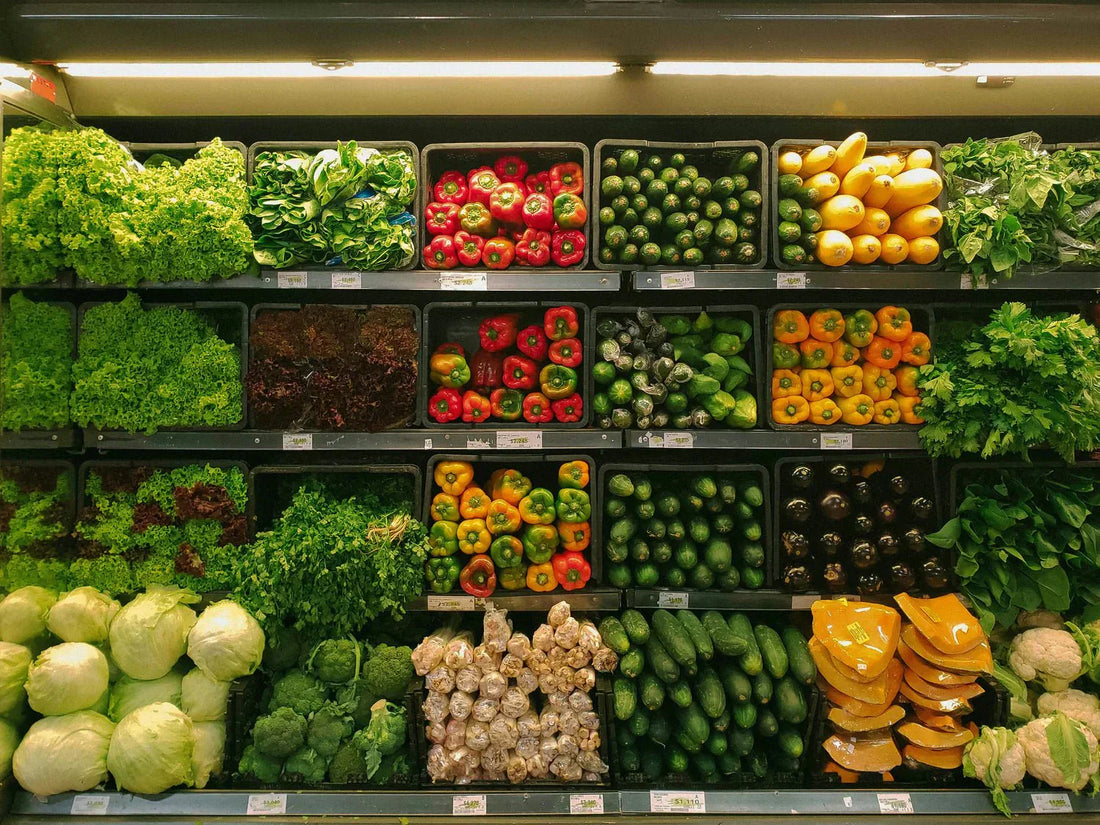Vegan Diet : A Beginner’s Guide to Plant Based Eating
As of 2023, nearly 1.1% of the world’s population, i.e. approximately 88 million people, were vegan. What’s even more interesting is that this trend is showing no signs of slowing down.
But what is a vegan diet?
Why should one choose it over other diets?
What do vegans eat?
And where exactly should one get started?
If these questions are on your mind, you're in the right place. This guide will help beginners understand veganism, why it's popular, and answer any other questions.
For those considering switching to veganism, this guide will provide all the knowledge and resources you need.
Let’s get started!
What is a Vegan diet?
Veganism, at its core, is a lifestyle that abstains from the consumption of animal products. However, it’s not just limited to the food we consume. Instead, it encompasses a holistic commitment to minimizing harm to animals. This involves choosing ethical brands, avoiding the use of leather etc.
The motivation behind choosing veganism is multi-faceted. It is grounded in ethical considerations, environmental concerns, and the health benefits associated with plant-based diets.

Is Veganism the Same as Plant-Based Eating?
Yes, and No. While all vegans consume a plant based diet, not all plant-based eaters can be considered vegan.
Both Veganism and Plant-Based Eating prioritize plant-centric diets. However, veganism encompasses a holistic lifestyle. It focuses on avoiding all animal products, including clothing and cosmetics. Plant-Based Eating, on the other hand, primarily revolves around dietary choices.
Why are People Going Vegan?
Ethical Considerations
One of the primary drivers of veganism is a deep concern for animal welfare. The ethical stance of veganism rests on the conviction that animals are sentient beings deserving of a life free from suffering.
According to a report by the Humane Society International, factory farming, a prevalent method of animal agriculture, is responsible for widespread animal suffering. It causes billions of animals to be subjected to overcrowded and unsanitary conditions.
Reducing or eliminating participation in such practices is a powerful reason to adopt a vegan lifestyle.
Environmental Concerns
Livestock farming is a major contributor to greenhouse gas emissions. It also leads to deforestation, and depletion of natural resources. A study in the journal "Nature" estimates that the global livestock industry contributes to 14.5% of all human-induced greenhouse gas emissions.
Choosing a plant-based diet is seen as a proactive step in reducing one's carbon footprint. It also helps mitigate deforestation, and promote sustainable land use.
Health Considerations
Numerous studies have linked vegan diets to a reduced risk of chronic heart diseases.
Plant-based diets have also demonstrated potential in reducing the risk of certain types of cancer. The WHO has classified processed meats as Group 1 carcinogens, associating meat consumption with cancer.
Furthermore, plant-based eating is associated with improved insulin sensitivity and better blood sugar control. This reduces the risk of developing type 2 diabetes.
Getting Started with Veganism
Starting out on a vegan journey involves thoughtful planning and consideration. The transition to a vegan lifestyle can be approached in two primary ways: the gradual approach and the cold turkey approach.
Gradual Approach
Many individuals find success in gradually transitioning to a vegan lifestyle. This allows time for adjustment and learning. This method involves progressively reducing animal products while incorporating more plant-based foods into daily meals.
By gradually substituting meat and dairy with plant-based alternatives, individuals can explore diverse flavors and discover satisfying alternatives. This eases the process of eliminating animal products from their diets.
Cold Turkey Approach
Contrastingly, some individuals prefer an immediate and decisive shift to veganism. This is known as the cold turkey approach. This method involves cutting out all animal products abruptly.
This approach can yield rapid changes. However, it requires careful planning to ensure proper nutrient intake.
Whichever approach one chooses, understanding the nutritional aspects is crucial. It is important to ensure the adequate intake of essential nutrients such as protein, iron, calcium, vitamin B12, and omega-3 fatty acids during the transition. It is also advisable for individuals to consult with a registered dietitian or nutritionist. They can help create a well-balanced and personalized meal plan.
Vegan Food Alternatives

For those new to veganism, the prospect of finding suitable alternatives can be daunting. Here’s a list we have prepared for you to help you get started:
Plant-Based Protein Sources
- Legumes
Legumes are a primary source of plant-based protein. Varieties such as lentils, chickpeas, and black beans are not only rich in protein but also provide essential fibers and nutrients.
- Tofu and Tempeh
Derived from soybeans, tofu and tempeh are protein-packed alternatives to animal products. Tofu, with its neutral flavor, absorbs the taste of the ingredients it's cooked with, making it adaptable to various dishes. Tempeh has a nutty flavor and a firm texture, and adds a unique element to sandwiches, salads, and stir-fries.
- Quinoa
As a complete protein source, quinoa stands out for its nutritional density. A novice vegan might find this grain to be an excellent starting point. Other grains such as bulgur, farro, and barley can also be explored for their nutritional benefits and adaptability.
- Nuts and Seeds
Nuts and seeds are not only rich in protein but also provide healthy fats and essential nutrients. Almonds, walnuts, chia seeds, and flaxseeds are excellent additions to a vegan diet.
- Edamame and Seitan
Edamame, young soybeans, are a protein-rich addition to salads and stir-fries. Seitan, a high-protein meat substitute made from wheat gluten, serves as a hearty option for those missing the texture of meat.
Dairy Alternatives
- Plant-Based Milks
Soy milk, almond milk, and oat milk are popular choices, each offering unique flavors and nutritional profiles. Soy milk stands out for its protein content, almond milk for its nutty taste, and oat milk for its creamy texture.
- Vegan Cheese
Vegan cheese is made from plant-based ingredients such as nuts, soy, or tapioca starch. It comes in various flavors and textures, including slices, shreds, and spreads.
- Vegan Yogurt
Vegan yogurt offers a dairy-free alternative to regular yogurt. It mirrors the creamy consistency of traditional yogurt.
Egg Replacements
- Flaxseeds and Chia Seeds
Flaxseeds and chia seeds are popular natural egg replacements, particularly in baking. When mixed with water, these seeds create a gel-like consistency that mimics the binding properties of eggs.
The omega-3 fatty acids found in flaxseeds and chia seeds add a nutritional boost to recipes.
- Commercial Egg Replacers
These products are often made from starches, leavening agents, and other plant-based ingredients. They come in powder or liquid form. Notable brands include Ener-G, Bob's Red Mill, and Follow Your Heart.
Snacks and Desserts

Vegan Protein Bars by 100calsnacks
- Nut-Based Snacks
Nuts, such as almonds, walnuts, and cashews, can be enjoyed on their own or incorporated into energy balls and trail mixes. They provide a satisfying crunch and a source of healthy fats.
- Fresh Fruits
Fresh fruits, nature's candy, offer a naturally sweet and refreshing snack option.
- Vegan Chocolate and Treats
The popularity of veganism has spurred the development of a wide range of vegan chocolate bars, cookies, and other sweet treats.
Vegan Chocolate Protein Bars and Peanut Butter Protein Bars from 100 calorie snacks are great options to consider.
What’s more?
- They are free from added sugar and sugar alcohols
- Each serving contains around 5g of protein
- They are infused with superfood adaptogen for calmness and energy
- These bars contain only 2g net carbs per serving, making them perfect for keto-snacks enthusiasts.
- They are made using non- GMO ingredients
- They are gluten free snacks
- THEY TASTE AWESOME
How about you try out for yourself and find out?
- Dairy-Free Ice Cream
Vegan ice cream, often made from coconut, almond, or soy milk, has become a staple in the frozen desserts aisle. Ben & Jerry's and So Delicious are some brands offering an extensive selection of vegan ice cream flavors.
Staying Informed
When it comes to following any diet, the importance of staying informed cannot be overstated. Staying informed allows individuals to align their vegan practices with the latest evidence. This helps ensure that they make well-informed decisions regarding nutrient intake. It also enables them to be mindful of potential health benefits, and the ecological footprint of their food choices.
That said, here are some resources to help you expand your knowledge on the subject:
Books and Documentaries
- "Eating Animals" by Jonathan Safran Foer. An exploration of the ethical, environmental, and health implications of consuming animal products.
- Forks Over Knives (Documentary). Examining the health benefits of a vegan diet through personal stories and scientific evidence.
Online Resources and Communities
- Nutritionfacts.org: Dr. Michael Greger's website provides evidence-based information on plant-based nutrition.
- Reddit's Vegan Community (r/vegan). A supportive online community for sharing experiences, recipes, and advice.
Continuing Education on Plant-Based Nutrition
Plant-Based Nutrition Certification. Programs like the T. Colin Campbell Center for Nutrition Studies offer certifications in plant-based nutrition.




